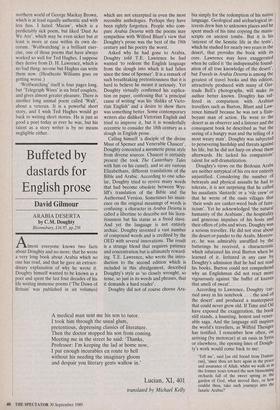Buffeted by dastards for English prose
David Gilmour
ARABIA DESERTA by C.M. Doughty
Bloomsbury, £16.95, pp.256
Almost everyone knows two facts about Doughty and no more: that he wrote a very long book about Arabia which no one has read, and that he gave an extraor- dinary explanation of why he wrote it. Doughty himself wanted to be known as a poet and spent the last four decades of his life writing immense poems (`The Dawn of Britain' was published in six volumes) which are not excerpted in even the most recondite anthologies. Perhaps they have been rightly forgotten. People who com- pare Arabia Deserta with the poems may sympathise with Wilfred Blunt's view that Doughty's prose was the best of the 19th century and his poetry the worst.
Asked why he had gone to Arabia, Doughty told T.E. Lawrence he had wanted `to redeem the English language from the slough into which it had fallen since the time of Spenser'. It is a remark of such breathtaking pretentiousness that it is hard to believe he meant it seriously. Yet Doughty virtually confirmed his explica- tion on paper, confessing that 'a principal cause of writing' was his 'dislike of Victo- rian English' and a desire to show there was something better. Some contemporary writers also disliked Victorian English and tried to improve it, but it is wonderfully eccentric to consider the 18th century as a slough in English prose.
Calling himself 'a disciple of the divine Muse of Spenser and Venerable Chaucer', Doughty concocted a mesmeric prose style from diverse sources. Chaucer is certainly present (he took The Canterbury Tales with him on his camel), and so are various Elizabethans, different translations of the Bible and Arabic. According to one scho- lar, Doughty tried to revive many words that had become obsolete between Wyc- liffs translation of the Bible and the Authorised Version. Sometimes his insist- ence on the original meanings of words is confusing: a character in Arabia Deserta is called a libertine to describe not his licen- tiousness but his status as a freed slave. And yet the language is not entirely archaic. Doughty invented a vast number of compound words and is credited by the OED with several innovations. The result is a strange blend that requires patience and concentration but is ultimately reward- ing. T.E. Lawrence, who wrote the intro- duction to the second edition which is included in this abridgement, described Doughty's style as `so closely wrought, so tense, so just in its words and phrases, that it demands a hard reader'.
Doughty did not of course choose Ara- bia simply for the redemption of his native language. Geological and archaelogical in- terests drew him to unknown places and he spent much of his time copying the manu- scripts on ancient tombs. But it is his `interest of the Semitic life in the tents', which he studied for nearly two years in the desert, that provides the book with its core. Lawrence may have exaggerated when he called it 'the indispensable found- ation of all true knowledge of the desert', but Travels in Arabia Deserta is among the greatest of travel books and this edition, attractively produced with many of Ger- trude Bell's photographs, will make its author better known. Doughty has suf- fered in comparison with Arabian travellers such as Burton, Blunt and Law- rence himself because he was not a flam- boyant man of action. He went to the desert as an observer and a listener and the consequent book he described as 'but the seeing of a hungry man and the telling of a most weary man'. Doughty was subjected to persevering hardship and threats against his life, but he did not harp on about them afterwards. He lacked his compatriots' talent for self-dramatization.
Doughty's views on the Bedouin Arabs are neither untypical of his era nor entirely unjustified. Considering the number of betrayals and physical assaults he had to tolerate, it is not surprising that he called his assailants 'clastards' or a 'vile crew' or that he wrote of the oasis villages that `their souls are canker-weed beds of fana- ticism'. Yet he acknowledged 'the natural humanity of the Arabians', the hospitality and generous impulses of his hosts and their offers of jobs and wives. Doughty was a serious traveller. He did not strut about the desert or pander to the Arabs. Moreov- er, he was admirably unruffled by the batterings he received, a characteristic which infuriated his rival Burton when he learned of it. Irritated in any case by Doughty's admission that he had not read his books, Burton could not comprehend why an Englishman did not react more vigourously against 'the buffet of knaves that smell of sweat'.
According to Lawrence, Doughty 'car- ried away in his notebook . . . the soul of the desert' and produced a masterpiece that could never grow old. If Time and Oil have exposed the exaggeration, the book still stands, a haunting, honest and vener- able saga. And the language still inspires the world's travellers, as Wilfrid Thesiger has testified. I remember how often, on arriving (by motorcar) at an oasis in Syria or elsewhere, the opening lines of Dough- ty's work would come back to me: `Tell me', said [an old friend from Damas- cus], 'since thou art here again in the peace and assurance of Allah, whilst we walk as ul the former years toward the new blossoming orchards full of the sweet spring as the garden of God, what moved thee, or how couldst thou, take such journeys into the fanatic Arabia?'


























































 Previous page
Previous page